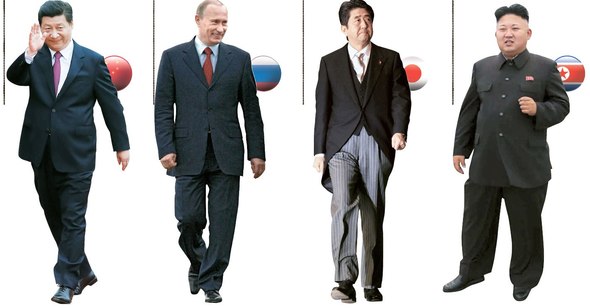 |
|
Chinese President Xi Jinping, Russian President Vladimir Putin, Japanese Prime Minister Shinzo Abe, and North Korean leader Kim Jong-un
|
“Equidistance strategy” attempts to increase Pyongyang’s bargaining strength with US
Possible North Korean summits with Russia and Japan are being mentioned in the wake of a recent surprise summit with China. Analysts suggested Pyongyang is adopting an “equidistance” strategy by expanding its diplomatic efforts with other countries since agreeing to hold summits with Seoul and Washington. Moscow announced on Mar. 29 that North Korean Foreign Minister Ri Yong-ho is to visit Russia shortly. When asked in a press briefing about the schedule for Ri’s visit, ministry spokesperson Maria Zakharova replied, “Efforts are still under way, and [Ri’s visit] will happen in the near future.” In a Mar. 26 report, Russia’s RIA Novosti news agency quoted Russian Foreign Ministry sources as saying Ri’s visit may take place as early as mid-April. Observers are also speculating North Korean leader Kim Jong-un could visit around mid-April, when Ri is expected to visit Russia. “While they’re officially preparing for a visit by Minister Ri, the current mood suggests a possible visit by Chairman Kim,” said a source familiar with the situation in Moscow. A possible North Korea-Japan summit is also being discussed, and some are predicting Chinese President Xi Jinping may visit North Korea. Japan’s Asahi Shimbun newspaper reported on Mar. 29 that Tokyo had recently used the General Association of Korean Residents in Japan (Chongryon) to express its interest in a summit with Pyongyang, with a possible meeting to take place in Pyongyang between Kim and Prime Minister Shinzo Abe in early June. Taiwan’s CNA quoted a Hong Kong civic group source on Mar. 30 as saying Xi plans to coordinate his visit to North Korea with the 65th anniversary of the Korean War Armistice Agreement on July 26. Pyongyang’s increased interactions with its neighbors is predicted to increase its bargaining strength and provide it with more room to maneuver in its upcoming US summit and the Six-Party Talks or other denuclearization talks. With plans already set for the inter-Korean and North Korea-US summits, it is now following an “equidistance strategy” of achieving balance by enlisting its other neighbors. China and Russia are also key as permanent members of the UN Security Council, which determines the matter of sanctions against the North. “The US may be the ones leading the North Korea sanctions discussions, but it’s China that does the actual sanctioning,” said University of North Korean Studies professor Koo Kab-woo. “North Korea’s short-term goal is to have the sanctions reduced, and its long-term goal is to establish its own allies in discussions on denuclearization and a peace regime,” Koo suggested. Dongguk University professor Kim Yong-hyun said Pyongyang’s recent activities with its China summit “suggest its aim is to establish a North Korea-led framework between the US and China.” “Russia may make its presence felt at a crucial moment. North Korea still needs to improve its relations with Japan in the future, if only for economic reasons,” he added. The message is that Pyongyang will have to pursue summits with Moscow and Tokyo to improve its bargaining strength and maximize its interests. North Korea has past experience with an “equidistance” or “balanced diplomacy” strategy: seeking to maintain a neutral stance without favoring any one country. A well-known example was its effectively equidistant diplomatic position between China and the Soviet Union when the conflict between those two countries was intensifying. After signing a Treaty of Friendship, Cooperation and Mutual Assistance with the Soviet Union in July 1961 for the provision of military assistance in cases of emergency, it signed another military alliance treaty with similar content five days later with China. By Noh Ji-won and Kim Bo-hyeop, staff reporters Please direct questions or comments to [english@hani.co.kr]






